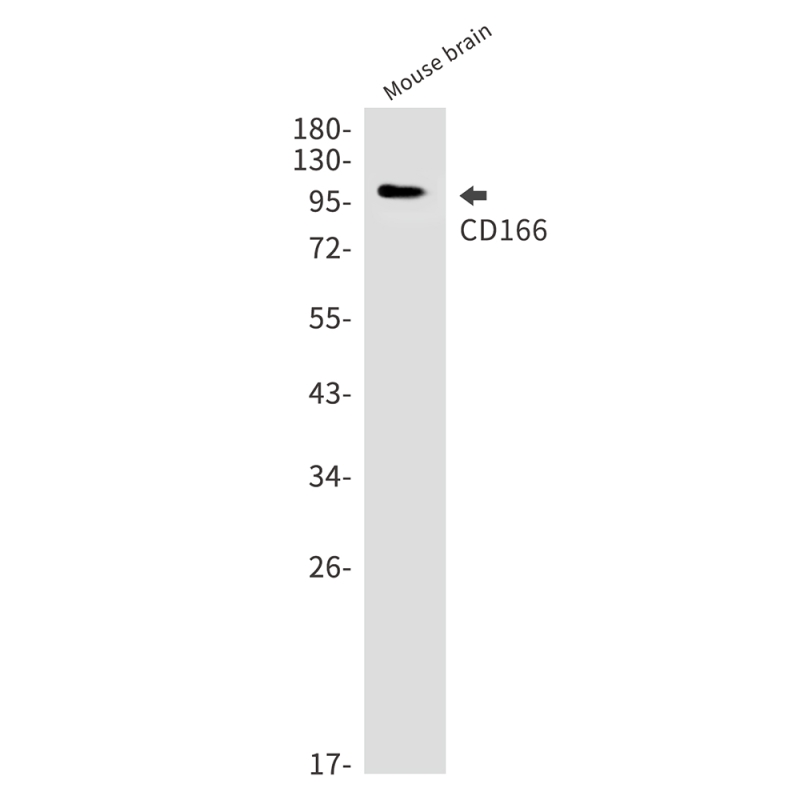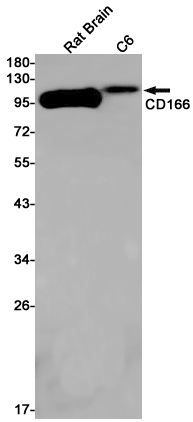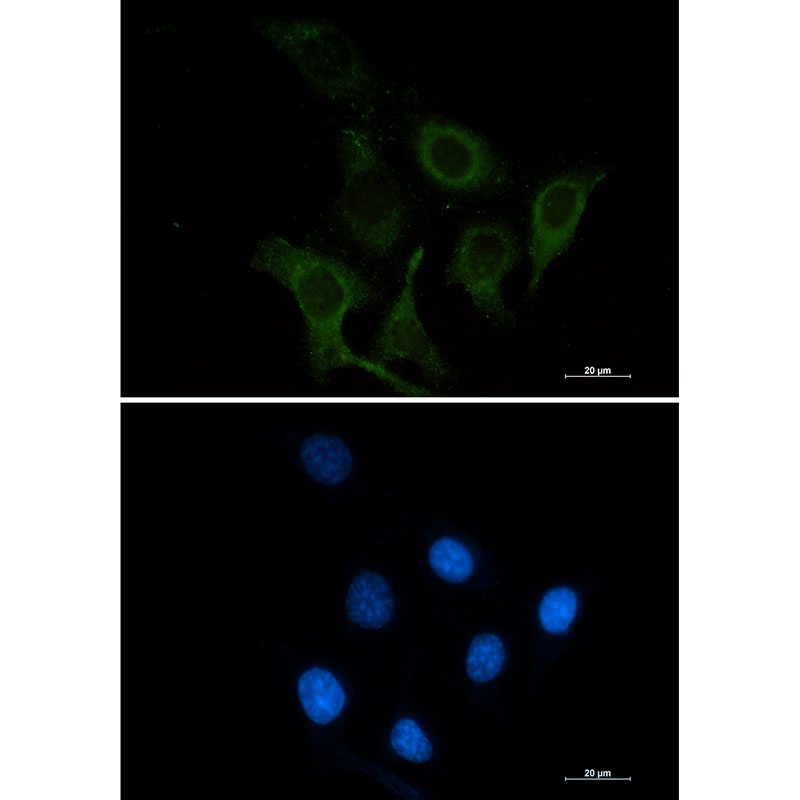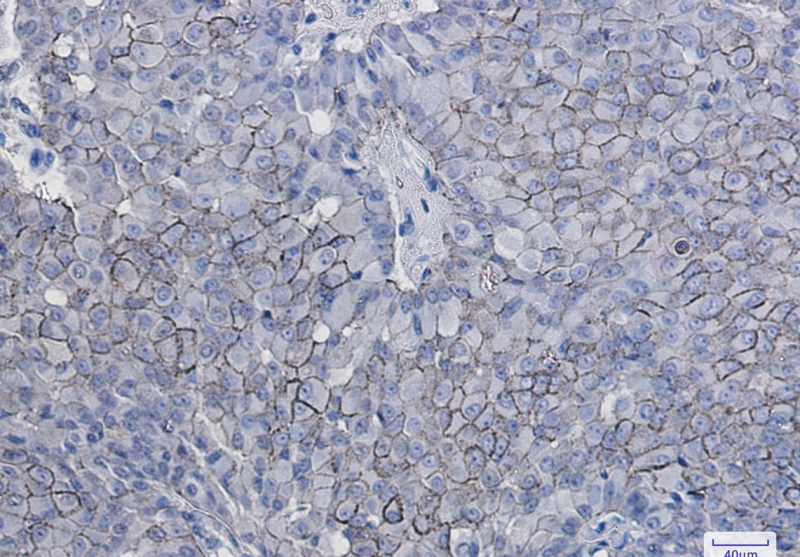



| WB | 咨询技术 | Human,Mouse,Rat |
| IF | 1/20 | Human,Mouse,Rat |
| IHC | 1/50-1/100 | Human,Mouse,Rat |
| ICC | 1/50-1/200 | Human,Mouse,Rat |
| FCM | 咨询技术 | Human,Mouse,Rat |
| Elisa | 咨询技术 | Human,Mouse,Rat |
| Aliases | ALCAM; MEMD; CD166 antigen; Activated leukocyte cell adhesion molecule; CD166 |
| Entrez GeneID | 214 |
| WB Predicted band size | Calculated MW: 65 kDa; Observed MW: 105 kDa |
| Host/Isotype | Rabbit IgG |
| Antibody Type | Primary antibody |
| Storage | Store at 4°C short term. Aliquot and store at -20°C long term. Avoid freeze/thaw cycles. |
| Species Reactivity | Human,Mouse,Rat |
| Immunogen | A synthetic peptide of human CD166 |
| Formulation | Purified antibody in TBS with 0.05% sodium azide,0.05%BSA and 50% glycerol. |
+ +
以下是关于CD166抗体的3篇代表性文献,按文献名称、作者和摘要内容概括列出:
---
**文献名称**:CD166/ALCAM expression is associated with tumorigenesis and therapeutic resistance in colorectal cancer
**作者**:Weidle UH, et al.
**摘要**:研究探讨CD166在结直肠癌干细胞中的高表达及其与肿瘤发生、转移和化疗耐药性的关系。通过抗CD166抗体阻断实验,发现其可抑制肿瘤细胞的自我更新能力,提示CD166可能作为治疗靶点。
---
**文献名称**:Targeting ALCAM/CD166 with monoclonal antibodies inhibits invasion of melanoma cells
**作者**:Swart GW, et al.
**摘要**:该研究开发了靶向CD166的单克隆抗体,并在黑色素瘤模型中验证其功能。实验表明,抗体通过干扰细胞间黏附及下游信号通路,显著抑制肿瘤细胞的迁移和侵袭能力。
---
**文献名称**:ALCAM/CD166 modulates immunogenic cell death in pancreatic cancer through EGFR/ERK signaling
**作者**:Kleffel S, et al.
**摘要**:文章揭示了CD166在胰腺癌细胞免疫原性死亡中的作用。使用特异性抗体阻断CD166可增强化疗药物诱导的免疫应答,其机制与EGFR/ERK通路调控相关,为联合免疫治疗提供新思路。
---
**文献名称**:CD166-specific CAR-T cells for the treatment of acute myeloid leukemia
**作者**:Hudecek M, et al.
**摘要**:该研究构建了靶向CD166的CAR-T细胞,并在白血病小鼠模型中验证其疗效。结果显示,CD166抗体修饰的CAR-T能有效清除白血病干细胞,且未显著损伤正常造血系统。
---
以上文献涵盖了CD166抗体在癌症治疗、免疫调节及靶向药物开发中的关键应用方向。
CD166. also known as Activated Leukocyte Cell Adhesion Molecule (ALCAM), is a transmembrane glycoprotein belonging to the immunoglobulin superfamily. It plays critical roles in cell-cell adhesion, immune response modulation, and cellular signaling. CD166 is expressed on various cell types, including activated leukocytes, endothelial cells, neural cells, and stem/progenitor cells, where it mediates homophilic (CD166-CD166) and heterophilic (e.g., CD166-CD6) interactions. Its involvement in processes like neuronal development, immune synapse formation, and cancer metastasis has made it a subject of extensive research.
CD166 antibodies are immunological tools designed to target specific epitopes on the CD166 protein. These antibodies are widely used in flow cytometry, immunohistochemistry (IHC), and Western blotting to study CD166 expression patterns in normal tissues and pathological conditions, particularly cancers. In oncology, CD166 overexpression is linked to tumor progression, metastasis, and poor prognosis in cancers like colorectal, breast, and prostate cancer. CD166 antibodies help identify cancer stem cells (CSCs) and evaluate tumor microenvironments. Additionally, they are explored in therapeutic contexts, such as blocking CD166-mediated interactions to inhibit cancer cell migration or designing antibody-drug conjugates. Recent studies also investigate CD166's role in stem cell niches and regenerative medicine. Commercial CD166 antibodies are typically validated for cross-reactivity, specificity, and applications across species (human, mouse, rat), enabling diverse experimental and clinical research applications.
×